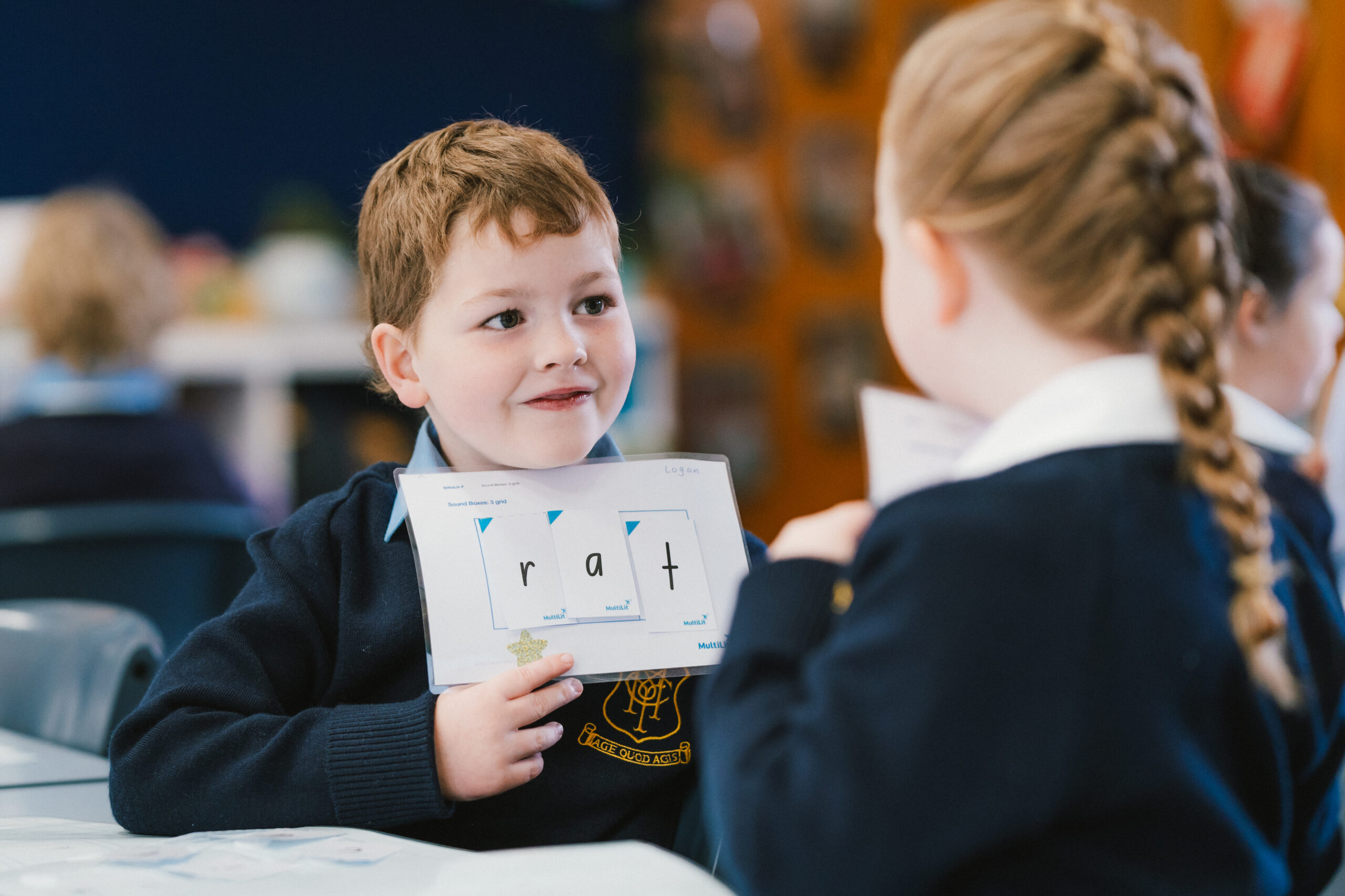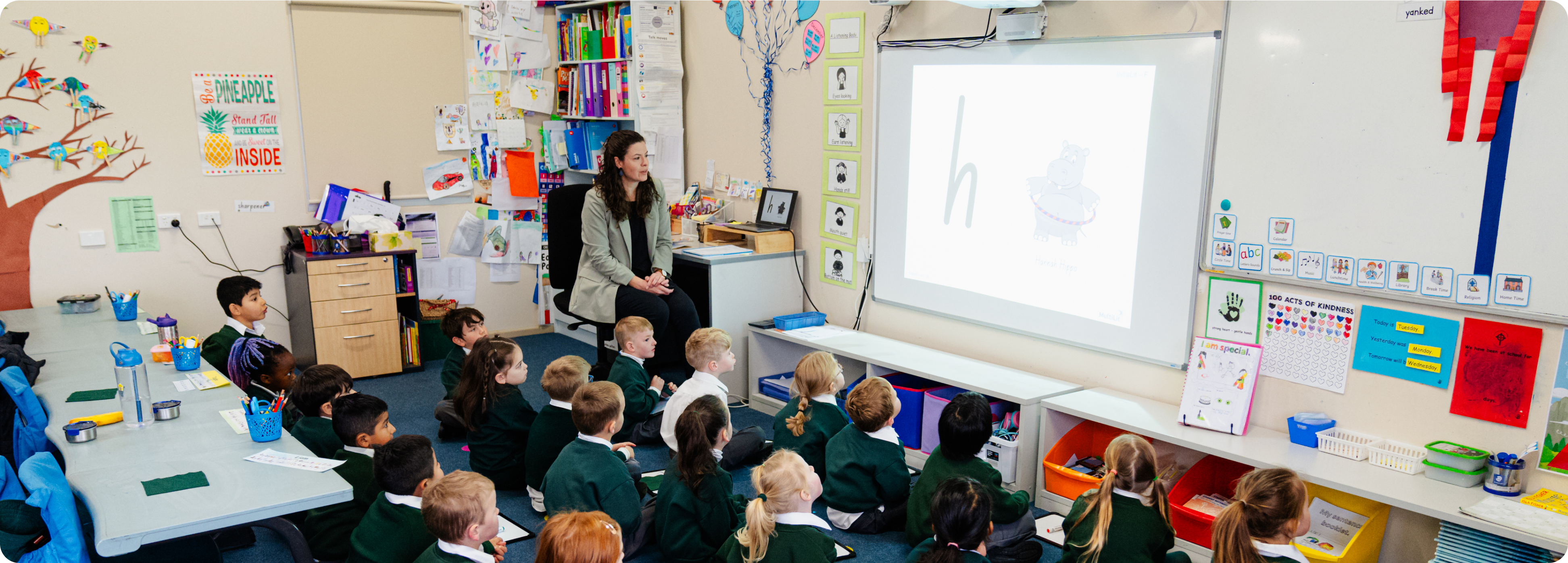Parents
Empowering parents with insights into the Catalyst Program to support their children’s learning.
ABOUT CATALYST
The Catalyst Approach
Catalyst aspires to transform lives through learning. Through this approach, we empower our Leaders and teachers to embed High Impact Teaching Practice in the classroom, by providing high-quality professional learning, resources and support, all informed by research.
Our Bold Goals
In 2020, we created a vision and approach of system-wide change, focusing on our teachers as the most important learner, to improve student learning across the Archdiocese. In three years, 56 schools, 1,700 teachers and more than 21,000 students have engaged in the Catalyst journey in someway. NAPLAN achievement data is a positive early indicator that we are heading in the right direction as we strive towards our Bold Goals.
Throughout our journey, we have consistently monitored, adapted, and refined the Catalyst program to transition from initial implementation to embedding and sustaining long-term practice change, all while staying true to our bold goals.
Every Student is a Competent Reader
Supporting every student with high-quality literacy programs to enable them to reach their learning potential.
High Impact Teaching Practice is visible in every classroom
Delivering impactful lessons combining evidence-based teaching practice and high-quality curriculum resources to improve student learning.
HOW TO HELP AT HOME
Learning alongside Catalyst at home
Catalyst is designed to give your child the best opportunity to learn and thrive in a positive, safe, and supportive environment.

TEACHING APPROACH
Pillars of Teaching and Learning
Catalyst has a precise focus on these pillars to guide what and how we teach, supporting teachers to help them embed more effective and efficient teaching methods.
Curriculum
Curated high-quality curriculum and classroom resources, guides and supports to ensure low variation and high expectations in classrooms and across schools in our system
Pedagogy
Catalyst seeks to support teachers to embed evidence-based, High Impact Teaching Practice with access to ongoing professional learning and coaching to ensure optimal opportunities for student engagement and learning
Assessment
System-wide assessment protocols and access to student data for teachers to inform their instructional decisions to ensure every student reaches their full potential
Teaching Approach
Explore the fundamentals of our approach
HIGH IMPACT TEACHING PRACTICE
Setting clear expectations for active learning
High Impact Teaching Practice (HITP) helps to establish clear expectations for students, ensuring they enter the classroom prepared and ready to learn. Teachers have structured lesson plans, resources and guidance on how to consistently apply the principles. As a result, students become more actively engaged in their learning whilst building knowledge, leading to improved classroom behaviour through clear direction.


LITERACY
Understanding the Science of Reading
The Science of Reading integrates insights from education, linguistics, cognitive psychology, special education, and neuroscience to examine the cognitive processes vital for effective reading.
By understanding how students learn to read and identifying the challenges when they don’t acquire basic reading skills, we have developed a systematic classroom approach to reading.
ENROLMENTS
Enrol your child in one of our Catholic Schools
Our Catholic schools strive to be inclusive partnership between individuals, communities and governments based on the principles of equity, social justice and religious freedom. Our schools also have strong partnerships with the parishes they serve.
Our schools and early learning centres for pre-schoolers are open to all who are willing to support the philosophy, values and aims of Catholic schooling.

Testimonials
“Since the change in our pedagogy at St Mary’s we’ve had a lot of positive feedback from parents.
Parents feel as though their children are gaining confidence with their learning and they’re excited to come to school.”
“This way of teaching has made our lessons more engaging. We are reminded of past content through daily reviews so I am able to remember and recall information a lot better. By going back to past content and reminding us of these concepts we don’t forget it and I am able to better recall that information. “
“The biggest difference of Catalyst is that it gave the students a level playing field.”
“Changes that I have noticed have definitely been through the explicit learning instructions the teachers deliver. That repetitiveness really targets the children’s cognitive learning.
So, for my children when they get home, they can actually tell me what they’ve learnt, not just that day but that week and month. As a parent, you can’t really ask for much more than that.”
“The class is very engaging and I feel comfortable contributing to class discussions because of the environment of the classroom and the teaching style of my teacher.”
FAQs
Answers to your most commonly asked questions
-
What does Catalyst mean for my child/children?
Catalyst ensures every student in every classroom across the Archdiocese has access to teachers who deliver high-quality engaging and impactful lessons.
Catalyst provides a consistent approach to teaching and learning across our Archdiocese, making the movement between classes and schools seamless.
How will Catalyst improve teaching and learning outcomes for my child?The Catalyst approach is based on the best available research on how best students learn.
Leveraging this research ensures our approach is the most effective and efficient possible to maximise learning opportunities for students.
A key focus of Catalyst is on early literacy. Research has shown the importance high-quality of early learning to future academic success. Our literacy focus for the early years (K-2) will provide all students with the foundational skills for future learning.
How can I support my child at home?Parents are encouraged to discuss how they can best support their child’s learning at home with their teacher. Some ways parents may support teaching could include
- Encourage daily reading with your child and support them to explain what they learnt or enjoyed in the book. For younger children, ask them to read aloud to you.
- Encourage your child to talk about a topic, idea or skill they have learnt at school, on a daily basis.
- Ask your child’s teacher for specific support and advice for reading together at home.
Where am I learn more about the foundational research that underpins Catalyst?Informed by the Science of Learning and Science of Reading, Catalyst will develop excellent principals, leadership teams and teachers in all Catholic Education Archdiocese of Canberra & Goulburn (CECG) schools through evidence-based professional learning programs.
How will Catalyst improve Teaching and Learning outcomes?Catalyst is based on the best available research on how students learn, retain and retrieve information.
Leveraging this research ensures our approach and the implementation it in our classrooms is the most effective and efficient way possible for student learning.
Why does my school have professional learning days for teachers?To ensure our teachers are kept up to date with the latest in teaching and learning, schools across the Archdiocese will hold professional development days throughout the year.
These professional development days enable our leaders and teachers to engage in system-wide professional learning to determine how they will use the collective knowledge and provided resources, effectively in the classroom.
-
What is Catalyst?
Catalyst ensures every student in every classroom has access to high-quality instruction from teachers who deliver engaging and impactful lessons.
Catalyst provides a consistent approach to teaching and learning across our Archdiocese, making the movement for teachers and students between schools seamless.
This teaching and learning approach is based on the best available research on how students learn, retain and retrieve information.
Learn more about our Teaching Approach
Learn more about CatalystWhy do we need Catalyst?Catalyst ensures every student in every classroom has access to high-quality instruction from teachers who deliver engaging and impactful lessons.
Catalyst provides a consistent approach to teaching and learning across our Archdiocese, making the movement for teachers and students between schools seamless.
This teaching and learning approach is based on the best available research on how students learn, retain and retrieve information.
How does Catalyst align with the CECG vision?Catalyst aligns to the CECG strategic plan Faith in Learning through our committment to supporting our teachers in their vocation to enrich students’ lives through learning. Catalyst aligns to CECG vision of “Jesus Christ, our greatest teacher, calls us to share and bear witness to our Catholic Faith and Tradition, build inclusive communities and deliver contemporary quality learning opportunities for every person.”
Catalyst does this by supporting our teachers, Leaders, and Principals to transform students’ lives through learning ensuring excellence and equity in education
Where can I learn more about the foundation research that underpins Catalyst?Catalyst is backed by a comprehensive body of knowledge and research on how students learn to read, known as the Science of Reading and the Science of Learning.
Explore our Teaching Approach
Learn more about the Science of Learning by checking out the resources available in the Catalyst Knowledge Packs –
Knowledge Pack 1.0
Knowledge Pack 2.0
Knowledge Pack 3.0How will Catalyst improve Teaching and Learning outcomes?Catalyst is based on the best available research on how students learn, retain and retrieve information.
Leveraging this research ensures our approach and the implementation it in our classrooms is the most effective and efficient way possible for student learning.
Where can I find out more about working with CECG and Catalyst?With 56 schools and 9 early learning centres across ACT & NSW we’re working to support the development of excellent principals, leadership teams and teachers in schools across the Archdiocese, through the Catalyst program.
